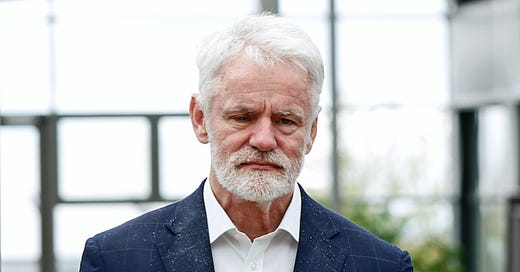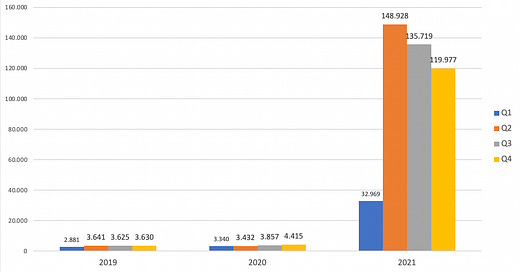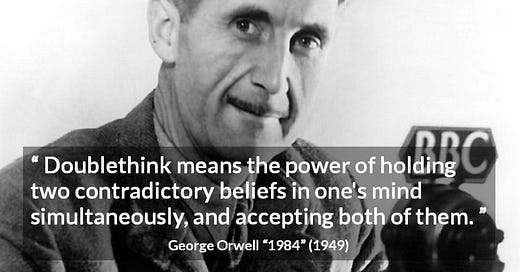

Discover more from From Symptoms to Causes
The Narrow Road Ahead
The threat from artificial intelligence is a wake-up call: We have no option but to take back control.
I’ve been preoccupied with artificial intelligence (AI) lately. More specifically with preparing and delivering a webinar on how we can take advantage of the new Large Language Models (LLMs) such as ChatGPT to help us become better at logical thinking, and preparing a training course on the subject.
During the past ten months or so, a good deal of my time has been devoted to training people in logical analysis. Our students are mostly corporate executives who want to become better at decision-making. But also individuals who simply want to have better control over their own lives. The methodology we teach is difficult and time-consuming to master, but once mastered, the benefits are great.
A couple of months back, I began experimenting with using AI to help speed up and improve logical analysis, and the results are impressive. Experimenting with this highly focused and specific use of AI has led me to think about this technology from a broader perspective also. What can it do? What are its limitations? How will it change our lives? How can we make the best use of it? What are the threats it brings?
The difference between AI as we knew it until ChatGPT was launched for general use, and the new LLMs is that now it has been brought into our lives directly, and it uses our language. Already, over a 100 million people use ChatGPT, well over 1% of the world’s population. We use it to write and summarise texts, look for information, help us reply to emails, prepare presentations, I could go on and on. It has become part of our lives and the part it plays will become bigger and bigger.
In this way, AI helps us become more productive. But we must also be aware of the dangers it brings. Recently, historian Yuval Noah Harari claimed AI has now hacked the operating system of civilisation. He is referring to language of course. Without language we wouldn’t have any societies, any law, literature, science … For it is language that makes us human. And now, AI has mastered language. Some say, referring to the flaws and mistakes the models make, that it hasn’t mastered it, but this is false consolation. Surely the models aren’t perfect, they sometimes misunderstand us, they sometimes respond like a less-than-fluent foreigner, but that's temporary only: The sneering remark: “No wonder it’s called artificial” is based on shortsightedness and wishful thinking. AI is mastering language, and we have to face it.
The European Union now plans to use AI to listen in on all online conversation. This is justified by the need for preventing child-abuse. In East-Germany and the Soviet Union authorities opened people’s mail to spy on them, trying to find indications of subversive activity. But they never opened all mail. It simply wasn’t possible. But now, with the help of AI, this is possible. The first justification is child-abuse. But how long until other justifications are fabricated? Public health, climate change scepticism, you name it.
“There is no such thing as society” British Prime Minister Margaret Thatcher famously claimed in 1987. There are individuals, she said, there are families, but society doesn’t really exist.
“There is such a thing as a society” another British Prime Minister, Boris Johnson said in March 2020, self-isolating in a bunker. “One thing I think the coronavirus crisis has already proved is that there really is such a thing as society,” he continued.
Thatcher’s remark was made in the context of the ever growing demand for “society” to ensure everyone’s well-being, society being the authorities, the government. According to Thatcher, such demands were misguided: “There are individual men and women” she continued, “and there are families and no government can do anything except through people and people look to themselves first. It is our duty to look after ourselves and then also to help look after our neighbour and life is a reciprocal business…” In short, we have responsibility for ourselves first, and then we have responsibility towards others, but behind everything done by the authorities, by “society” there are people.
But what did Boris Johnson mean by his remark? How did the coronavirus crisis prove the existence of society? What was his understanding of what society is?
Boris Johnson locked down society in March 2020. He decided, out of panic over a respiratory disease, to tear up the fabric of society. He closed schools, closed down businesses to take away people’s livelihoods, had them arrested for meeting up in parks, banned them from saying goodbye to dying relatives. In short, to him, society was of such little importance that shutting it down was of no consequence. Still, he claimed there was such a thing as a society. Why?
It is obvious how far removed Johnson’s understanding of what society is is from Thatcher’s. While for Thatcher, society is comprised of all the individuals, their relationships and responsibilities toward themselves and others, for Johnson the foundation of society is something completely different. It isn’t the intricate web of relationships, duties and rights, instead society is a mob, driven mad by irrational fear, acting out of a deeply selfish drive for physical self-preservation with no concern for others, or for that matter, not even self-preservation; a mob driven by fear may just as well decide to sacrifice itself on the altar of its own madness; Waco comes to mind, or the lemmings jumping off cliffs to their death. This is Johnson’s definition of what society is: It can exist only on the basis of fear. It is not comprised of individuals, but of a mad mob. This was, for him, the proof that there is such a thing as a society.
While Thatcher’s statement that society didn’t exist is often taken out of context, considering it at face value is important also. Not so much as a statement reflecting her beliefs, as a telling indication of a change in values that began to permeate society about 40 years ago. We do not care about society any more. We do not care any more about our basic human rights. We don’t even care about our children; only about our own temporary comfort and, above all, our physical safety. And this development is now culminating in the belief that all that matters is our individual, subjective experience; I am what I decide to believe I am, regardless of reality; one can only wonder if solipsism really is the logical endpoint of individualism.
The latest version of ChatGPT searches the internet for answers. It is no longer limited by data up to September 2021. The striking difference between ChatGPT and regular search engines is that while the search engine provides a long list of results when prompted by a question or searchword, ChatGPT provides a single answer, unless specifically asked to provide a list of sources. In other words, it performs the search for us. If I want information on the latest development in AI, Google provides me with a long list of links. ChatGPT searches the internet and then provides a comprehensive answer.
This is convenient of course, but it is also very dangerous. As many have pointed out, there is a danger of government, corporations or other powerful players using AI to manipulate us by falsifying information. Others worry about already existing biases being magnified through AI, increasing inequality, or that it will take away our jobs.
AI now offers to do our writing for us, Jane Rosenzweig points out in a recent LA Times article, referring to a technology being rolled out by Google Docs. “Writing is hard because the process of getting something onto the page helps us figure out what we think — about a topic, a problem or an idea. If we turn to AI to do the writing for us, we’re not going to be doing the thinking either”, Rosenzweig says. Using the bot to do the writing for us is easy, she continues, and if we stop asking difficult questions, analysing evidence and considering counterarguments “we may get to the point when we don’t know how to think for ourselves anymore.”
This is in fact the essence of what Harari means when he talks about AI having hacked the operating system of civilisation. This is the fundamental difference between this latest AI revolution and the previous industrial revolutions. We now risk not only losing low-level repetitive, menial jobs, we risk becoming slaves to an intelligence soon to become superior to our own, and it is entirely of our own making. As Rosenzweig concludes: “If we wave that magic wand uncritically, we risk outsourcing not just the mundane but the meaningful.”
The view of society as something that exists independently of the people, but still with responsibilities towards them, is becoming more and more prevalent. At the same time all too many have given up trying to take part in shaping society. "Those on the right are not very political really, they just want to make money during the day, and barbecue in the evening, while those on the left think they can solve society's issues by organising meetings or reading poetry" Icelandic libertarian Dr. Hannes Gissurarson said in a TV interview in 2009, referring especially to the voters of Iceland's largest political party, the centre-right Independence party. But in most Western societies this is the position held by the majority of voters. We may vote every four years, but apart from that we delegate the power that ultimately lies with us, the people, to specialists; politicians, institutions, unelected officials.
But we fail to recognise that by taking our hard-earned rights as a given, we let down our guard and may ultimately lose those rights. The utter indifference we showed towards the unprecedented infringement of our most basic personal liberties during the Covid years is a truly worrying indication of this. Let alone our indifference now towards the EU's plans for total surveillance of all our online conversation. In short, as long as we can make money during the day and barbecue in the evening, we couldn't care less if we end up in a state of total surveillance, in a new East-Germany of the West. This is the unavoidable consequence of the belief that there is no such thing as society, or more precisely, that society doesn't concern us.
It is in this atmosphere of indifference that a new technology arrives, a technology that has hacked the operating system of civilisation. It offers to make our lives easier than ever before. We can let it answer all our questions, handle the administration of our work, answer our emails, drive our cars, manage our homes. And we can let it write our essays for us, analyse our problems, in short, we can let it think for us. How long, then, until we let it vote for us also?
Free democratic society is already in danger. The reason is our own recklessness, our own failure to understand how freedom and democracy will only survive as long as we rise to our responsibility as citizens. For in the end it isn't really technology that threatens our freedom, it is us.
We are at a crossroads, this should be obvious to all of us, now that we have the option to outsource to technology our very capacity for thinking. To some, this may seem like a small step, but in fact it is a giant leap, and if we take that leap there is no way back.
But we have a choice. Instead of succumbing to the temptation, oblivious of what it entails, we can stop and think. Instead of having AI do our writing for us, we can have it assist us improving it. Instead of outsourcing our thinking to technology, we can harness its power to become better at thinking. In fact that's the only way we can remain in charge. But for this to happen we must abandon the dream of an easy and effortless life. We must instead shoulder our responsibility for our own lives as free, thinking, doubting individuals, and our collective responsibility toward each other, as citizens in a society shaped by us. Instead of focusing only on ourselves, to make money during the day and barbecue in the evening, we must meet up in the public square, discuss, debate, think, even read poetry for that matter. For society is us, without us, it is nothing, and without it, we are nothing. This is the narrow road that lies ahead of us. This is the road we must now take.











I share a number of your concerns Thorsteinn and while there are many legitimate uses that AI can be put to, many would agree that the ubiquitous screens in our lives have already dumbed us down and lowered our attention spans, then just think what might be the effect of AI doing all of our thinking for us...
But my primary concern is that AI may soon become an unimaginably powerful ideological tool. This immediately raises the question WHO controls AI? What is this person’s worldview and HOW will this person be shaping AI and with WHAT objectives?? Like many other AI propagandists, Harari carefully erects a bogus “mystical aura” around AI, claiming for example that we "don't really understand how AI makes its decisions". In other instances, he has also claimed "AI will eventually be able to understand us better than we understand ourselves". Of course this bogus mystical aura is useful for instilling respect in the masses for AI bots, respect that will be very useful for an elite seeking to establish AI as an instrument of propaganda and manipulation. All bow down to AI... (copy-paste the Ewoks worshiping C-3PO, scene from Return of the Jedi -> Oh No, Oh No, Oh No...)
Dear Thorsteinn,
This is a beautifully written piece that perfectly strikes its target (we must not allow AI to substitute for our thinking), then bizarrely capitulates (but we can use AI to support our critical thinking). You are certainly have more faith in logical methodology than I ever have (a tangent I'll leave for another time), but this is another case where my Masters degree in AI has left me more sceptical than most about what we are doing with AI - and certainly far more than the MBAs currently selling VCs on AI.
"Instead of having AI do our writing for us, we can have it assist us improving it. Instead of outsourcing our thinking to technology, we can harness its power to become better at thinking."
Or, in other words, instead of letting AI write bad prose for us, we will let it conduct bad literature reviews for us instead...? It's all part of the thinking process! Outsourcing any of this is beyond risky. Having seen the abuses that search engines unleashed, I can find no reason to imagine that grafting super-Eliza onto the top of search engines will do anything other than further obfuscate any grounds for clarity of thought. This is especially so given the situation in academic publishing, which will be feeding a fair volume of the data sets for the large language models. Upon this path freshly mouldering madness lies.
Well, I don't expect that I'll convince you, but I still maintain the discourse is its own reward, at least. Here, as everywhere else, 'the means is the end'.
I have a Stranger Worlds coming in September that addresses some of the change in the circumstances in thought that computers brought about, and I'll try to remember to pop in a link here when it runs. In the meantime, I will leave you with this 3-minute reflection from last month:
https://strangerworlds.substack.com/p/laws-of-robotics
If it is not a rebuttal of what you write here, it is at least a more sceptical take on the issue of Large Language Models.
With unlimited love and respect,
Chris.